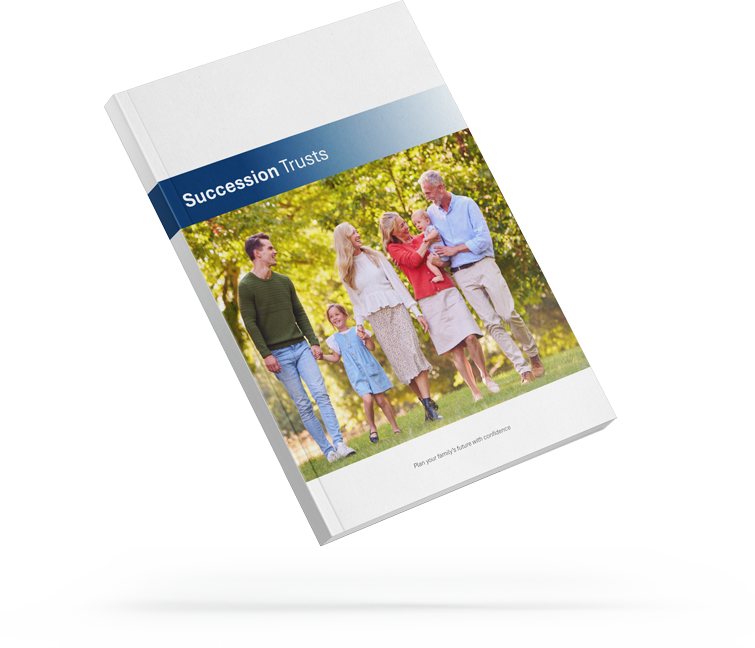Succession Trusts: Plan Your Family's Future with Confidence
We understand that you want to ensure your family's wealth is shared fairly and protected for future generations. A Succession Trust is a simple, secure way to manage how your assets are passed on to your children and grandchildren, avoiding disputes and giving you peace of mind. Designed with families in mind, it's a smart tool to plan for the long term while keeping your wishes clear and your legacy safe.

Depending only on a will can expose your family to legal challenges, delays, and disputes that could derail your plans. Wills go through probate, which can take months or years, and are vulnerable to claims under the Family Provision Act, where relatives—like children or spouses—might contest it if they feel inadequately provided for, potentially reducing your estate's value and causing family tension.
For example, in the 2020 Victorian Supreme Court case Joss v Joss [2020] VSC 424, an adult daughter successfully contested her father's will, which left most of his $14.5 million estate to her mother. Despite her past behaviour, including threats against her father and being estranged from the family for around 20 years, the court awarded her a substantial sum ($3.225m), showing how wills can be overturned. A Succession Trust, by holding assets outside the estate and clearly defining distribution, protects against such claims, ensuring your wealth is shared as you intend.
Get our guide to Succession Trusts which explains the finer details of how the Trust works and the options you have in setting up the trust.
For a concise comparison of the 2 main variations of Succession Trusts: Lockdown and Non-Lockdown, we have also put together a Succession Trust Factsheet to ensure you know how this choice will affect your Trust.
Download both of these below:

What is a Succession Trust?
A Succession Trust is a special arrangement that holds your family's assets, like money or property, and distributes them to your children or grandchildren based on rules you set. It's like a will but with more control and protection, ensuring your wealth goes where you want after you're gone or if you can no longer manage it. You decide how and when your assets are shared, making it a flexible way to support your family's future.
How a Succession Trust Works
You work with our team to establish the trust, with yourself as the trustee to manage it. Decide how your assets are shared, such as equal portions for each child or specific amounts, and when (e.g., after one or both parents pass away). You then transfer money, property, or other assets into the trust. This is like putting them in a secure family vault. After you pass away, your spouse or children take over control of the trust and follow your rules, distributing assets to your children or grandchildren, keeping your wishes clear and protected.
Decide how your assets will be shared after you pass away and add features and protections to the Trust.

Transfer money, property or other assets into the trust to separate them from what will form your estate.

Remain in control of the Trust, able to make changes if you want to. When you pass away, your spouse or children take control.

Defence Against Family Provision Claims
A Succession Trust helps shield your family's wealth from claims under the Family Provision Act, where someone like a child or spouse might contest your will if they feel left out. Unlike a will, the trust holds assets separately, so they're not part of your estate and can't usually be claimed.
Assets Outside the Estate: When you put assets like money or property into a Succession Trust, they're managed by a trustee and not counted in your estate. This means they're generally safe from family provision claims, which only target estate assets.
Clear Rules: The trust lets you set clear rules for sharing your wealth, like who gets what and when, making it harder for someone to challenge your plan.
Legal Protection: Since the trust isn't part of your will, it avoids the legal process called probate, where claims are more likely, keeping your wealth secure for your intended family members.
Reasons to Establish a Succession Trust
Features That Offer You Control
A Succession Trust provides a secure and flexible way to manage your family's wealth, ensuring it's shared according to your wishes while protecting your legacy. With customisable options, you can tailor the trust to meet your family's unique needs, safeguarding assets and promoting fairness. Here are some of the key features you can choose when setting up your trust:

Restrict benefits to only your direct descendants, like your children or grandchildren, keeping your wealth safe from non-family members.

Require a vote among chosen parties for approval before changing the trust, ensuring decisions reflect shared agreement and preventing unilateral changes.

Set a future date for distributing the trust's capital, such as when your youngest child turns 18, to protect funds until your family is ready to use them wisely.

Decide to share income and capital equally or in specific amounts tailored to their needs, with separate rules for when one parent passes and after both are gone, giving you precise control over your legacy.
These features help you plan with confidence, ensuring your wealth stays secure and your family remains united.
Benefits of a Succession Trust over a Will
Unlike a will, a Succession Trust:
Convert an Existing Trust
If you already have a trust in place, it may be possible to convert it to a Succession Trust. We will review the terms of the trust and if they allow for it, we can convert it so that your Trust becomes a succession trust, protecting your family's wealth, ensuring fair distribution to your spouse, children, or grandchildren, and setting clear rules for the future.
Assets in a Succession Trust Vs a Will
When planning how your assets—such as money, property, or investments—will be passed to your spouse, children, and family after your death, you might consider just using a will. However, implementing a Succession Trust should be seriously considered. Each works differently and has unique consequences for your family's future.
How they operate: A Succession Trust is a secure arrangement you set up during your lifetime to hold and manage your assets. You place assets like money or property into the trust, and the trustee distributes them to your spouse, children, or grandchildren after you pass away, based on rules you choose. You can decide when distributions happen, how much is distributed to each person, and customise options like restricting benefits to blood relatives. The trust can start working while you're alive, offering control and flexibility even before your death.
Protection for Your Family: Assets in a Succession Trust are held separately from your personal estate, shielding them from risks like creditors, lawsuits, and Family Provision claims. For example, if your child faces financial trouble, the trust can protect their inheritance from being claimed.
Preventing Family Disputes: Clear rules in the trust reduce arguments among your spouse and children by specifying how and when assets are shared. For instance, you can ensure equal portions for each child, avoiding feelings of unfairness.
Flexibility and Control: You can set rules for your spouse to receive control of the trust after you pass away, then passing to children later (non-lockdown), or pass control straight to your children (lockdown)
Faster Distribution: Assets in a trust avoid the probate process, meaning your family can access funds or property sooner, often within weeks.
How they operate: A will is a legal document that outlines how you want your assets distributed after you pass away. It only takes effect after your death and goes through a court process called probate to verify it. You name an executor to carry out your wishes, specifying who gets what (e.g., your spouse inherits the house, or children share savings equally). A will doesn't manage assets during your lifetime and relies on the executor to follow your instructions. Wills can also be contested.
Simpler but Less Protection: A will is easier to create but doesn't shield assets from risks like a child's bankruptcy or divorce. For example, if you leave a house to your child, their ex-spouse might claim half in a divorce settlement.
Risk of Disputes: Without clear legal structures, siblings or your spouse might disagree over your wishes, leading to costly legal battles during probate. This is common if a will is vague or contested.
No Lifetime Management: A will only works after your death, so it can't help manage assets if you become unable to make decisions during your lifetime.
Delays from Probate: Probate can take months or even years, delaying when your spouse or children receive their inheritance, especially if disputes arise.
Relying solely on a will may expose your assets to legal challenges, delay distributions, and fail to protect your family's inheritance from external risks.
Which Should You Choose?
A Succession Trust is ideal if you want to protect your wealth, prevent family disputes, and have control over how assets are shared, both during your lifetime and after. It's especially valuable for complex family situations or significant assets. A will is simpler and may suit smaller estates with straightforward wishes, but it offers less protection and flexibility. For the best outcome, many parents combine both, using a Succession Trust for key assets and a will for simpler distributions.
Your Questions Answered
Don't leave your family's future to chance—family disputes or unexpected risks can threaten your legacy. A Succession Trust ensures your wealth is shared as you wish, keeping your family united and secure.
We're here to help, if you want to learn more about BOMAD, BONAP or Succession Trusts, call us on
(02) 9231 5111
and speak to one of our friendly staff